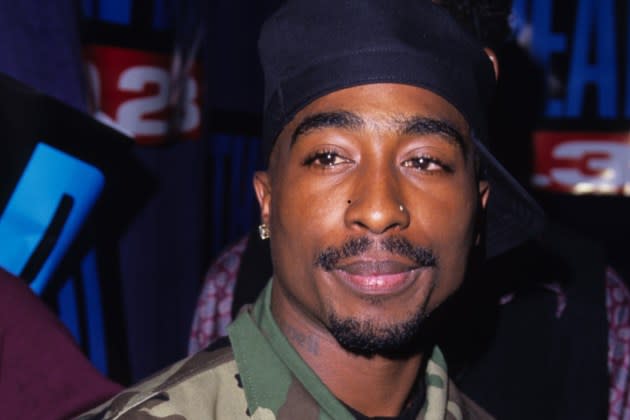A Bus Driver Claims He Was Cheated Out of Rights and Royalties for His Work on Tupac’s ‘Dear Mama’
- Oops!Something went wrong.Please try again later.
- Oops!Something went wrong.Please try again later.

A New York City musician and bus driver named Terrence Thomas has filed a copyright lawsuit claiming he has not been properly credited or paid for his work on Tupac’s classic song, “Dear Mama.”
Thomas, who used to DJ and produce under the name Master Tee, claims he was instrumental in the creation of “Dear Mama.” The lawsuit cites several old interviews with Tupac, as well as handwritten credits by the late rapper, naming Thomas as the creator of the song’s original beat.
More from Rolling Stone
Former Bad Boy President, Label Sued for Sexual Assault, Negligence
A$AP Rocky: New Video Captures Sound of Alleged Shooting, Flight from Scene
Sean 'Diddy' Combs and Cassie Settle Lawsuit After Rape Accusations
While Thomas has long been credited as a co-producer on “Dear Mama,” he claims he was “never properly and fully credited for his publishing copyright.” Instead, he claims, a “self-serving group,” led by Tony Pizarro (who’s long been considered the main producer on “Dear Mama”), and allegedly including executives at Universal Music Group and Interscope Records, “conspired and acted together to appropriate as much of the credit to ‘Dear Mama’ as they could to the exclusion of Master Tee while 2Pac was incarcerated and after his death.”
Thomas, who’s been working as a bus driver in New York City for the past 26 years, says he met Tupac in 1993, when he was working as a DJ for MC Lyte (who apparently brokered the introduction). Thomas and Tupac recorded “Dear Mama” in October 1993, when the latter was working on a new album, then-titled Stay True, but later released as Me Against the World.
The lawsuit cites a 1996 MTV interview Tupac gave, where he described the creation of “Dear Mama”: “Master Tee gave me the beat, you know, Lyte’s DJ,” he said. “He gave me the beat and I wrote it in the bathroom on the toilet, like on one of them early morning sit down for sessions. I just wrote it down and it came out like, like tears, you know, right?”
Further bolstering Thomas’ claim, the lawsuit includes a photo of what appears to be Tupac’s handwritten credits for the “Stay True” project. Next to “Dear Mama,” Tupac has apparently written, “produced by Master Tee, written by T. Shakur.”
As Tomas’ lawsuit acknowledges, the version of “Dear Mama” that he and Tupac recorded in 1993, was not the one that was widely released in 1995. However, Thomas claims that Pizarro used that original version of “Dear Mama” to create the version that was widely released. (A bootleg of the original version of the song is available on YouTube and is categorized as a “demo.”)
According to Thomas, the original master recording of “Dear Mama” was left at the New York City studio where it was made. When Tupac was sent to jail in 1995, following his conviction on two counts of sexual abuse, Pizarro was allegedly able to take the master recording and make “unilateral changes” to it. The suit claims this was done “at the bequest of Interscope Records, which Pizarro intended would eliminate Master Tee’s legitimate ownership of copyright.”
Pizarro allegedly “erased or muted” Master Tee’s producer tag at the start of the song, and added an interpolation of the Spinners’ song “Sadie,” on top of the original sample Thomas used, “In All My Wildest Dreams” by Joe Sample. Thomas claims Pizarro would’ve had to use the original master recording of “Dear Mama” because Tupac’s “original lyrics that he voiced” are used on Pizarro’s version; and, at the time, the “technology did not exist to separate the original tracks (i.e., the lyrics from the music, or ‘stems’) without using the original Master Recording.”
Thomas claims he was long unaware that he was not properly credited on “Dear Mama” because he was “duped by a skillful campaign of deception by Pizarro.” It was only recently that Thomas started to realize he should’ve been receiving more credit and royalties. The suit specifically highlights the release of the Hulu docuseries released this year, Dear Mama, about Tupac’s relationship with his mother, Afeni Shakur. Thomas “was not contacted nor asked to clear or license his rights,” the suit claims, which prompted him to “investigate his copyrights and monetary entitlements.”
Thomas’ suit claims that his recent “discovery of the infringement’ entitles him to bring the copyright suit, even though copyright law states that there’s typically a three-year limit on filing infringement claims. This argument, as Music Business Worldwide notes, has been accepted by some, though not all, U.S. federal appeals courts.
As for damages, Thomas is seeking “proper credit” as producer, co-writer, and co-publisher of “Dear Mama,” as well as “compensation for his contributions to the song.”
The lawsuit lists several defendants, including Pizarro, Universal Music Group, and Interscope Records. The creatives and production companies behind the Dear Mama docuseries, including director Allen Hughes and the Walt Disney Corporation, which owns Hulu, are also among the defendants. A rep for UMG/Interscope did not immediately return Rolling Stone’s request for comment, nor did Pizarro. A rep for Hughes and Dear Mama declined to comment.
Best of Rolling Stone
